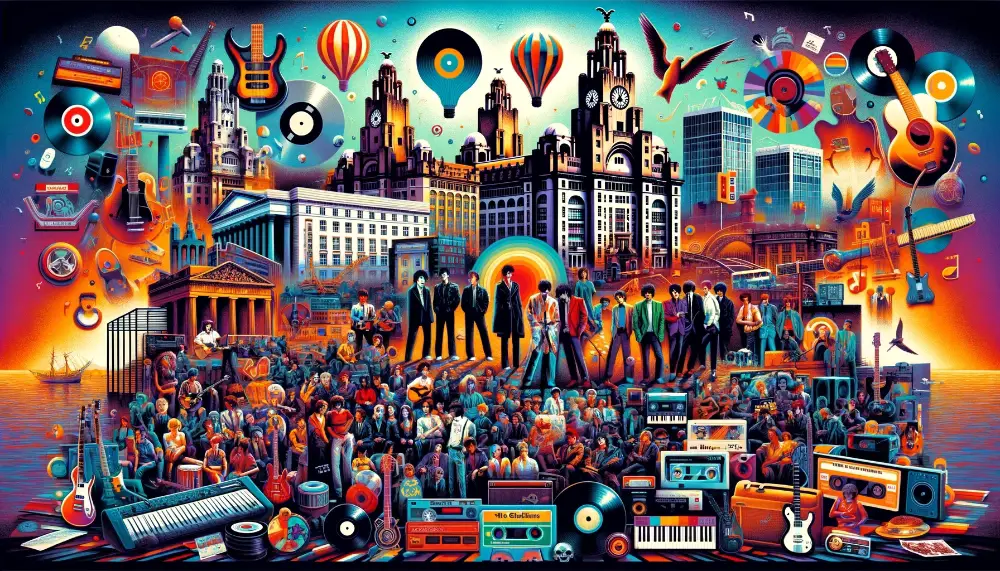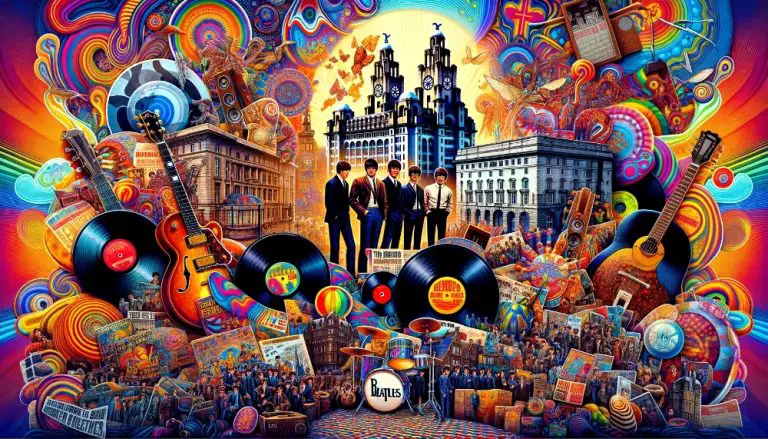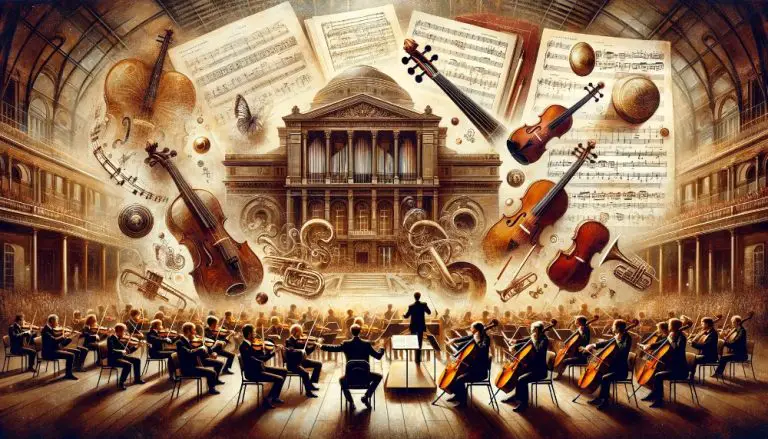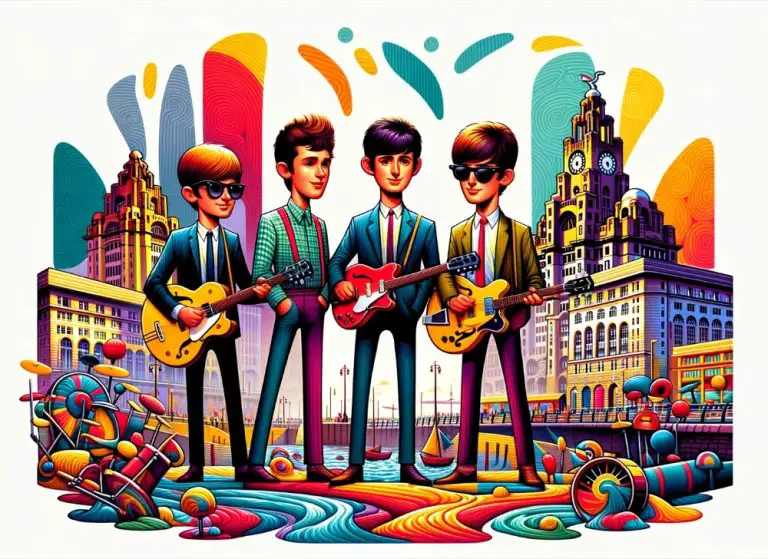Liverpool in The 80s and 90s: A Diverse Music Landscape

The 80s and 90s were an exciting time for music in Liverpool. The city’s music scene was characterized by eclectic sounds and iconic bands that left a lasting impact on the industry. From the catchy pop-rock melodies of The La’s to the energetic rock of Cast and The Lightning Seeds, Liverpool was buzzing with creativity and talent. Dance and electronic music also flourished, with bands like A Flock of Seagulls pushing boundaries and exploring new sounds. Cream, a notable Liverpool nightclub, played a significant role in shaping the music scene of this era.
Make sure you also check out:
Key Takeaways:
- The 80s and 90s Liverpool music scene was diverse and vibrant, with a wide range of genres.
- Iconic bands like The La’s, Cast, The Lightning Seeds, and A Flock of Seagulls emerged during this time.
- Cream, a notable Liverpool nightclub, had a significant influence on the music scene.
- The legacy of the 80s and 90s Liverpool music scene can still be felt in contemporary music.
- Nostalgia for this era has led to revivals and reimaginings of past sounds.
The La’s: Melodic Pop-Rock Sounds
The La’s, a Liverpool-based band, emerged as a prominent force in the late 80s and early 90s. They were well-known for their melodic pop-rock sound, characterized by catchy tunes and infectious melodies. One of their most iconic songs, “There She Goes,” became an anthem of the era and continues to be adored by music enthusiasts to this day. The La’s exemplified the immense talent and creativity that thrived within the Liverpool music scene during this vibrant period.
The Rise of Bands like Cast & The Lightning Seeds
In the vibrant Liverpool music scene of the 80s and 90s, bands like Cast and The Lightning Seeds emerged, contributing to the diversity and vibrancy of the era. Cast, fronted by former La’s member John Power, made a name for themselves with their energetic and anthemic rock sound. Their debut album, “All Change,” achieved commercial success and solidified their place in the music industry. Meanwhile, The Lightning Seeds, led by Ian Broudie, found chart success with their unique blend of pop and rock, delivering hits like “Pure” and the iconic football anthem “Three Lions.”
These bands embodied the creative spirit of the Liverpool music scene during this period, injecting new energy and excitement into the industry. Their unique sound and catchy tunes resonated with audiences, making them an influential presence in the British music landscape.
Cast: Energetic and Anthemic Rock Sound
Cast, formed in 1992, rose to prominence with their energetic and anthemic rock sound. The band was the brainchild of John Power, who had previously been a member of The La’s. Drawing inspiration from his experiences, Power formed Cast with guitarist Peter Wilkinson, drummer Keith O’Neill, and keyboardist/backup vocalist John “Liam” “Skin” Griffiths.
The band’s debut album, “All Change,” released in 1995, received widespread acclaim and commercial success. It featured hit singles like “Finetime” and “Live the Dream,” showcasing Cast’s melodic and anthemic sound. The album’s success established Cast as a band to watch and cemented their place in the Liverpool music scene.
The Lightning Seeds: A Blend of Pop and Rock
Formed in 1989, The Lightning Seeds brought a unique blend of pop and rock to the Liverpool music scene. Led by singer-songwriter and producer Ian Broudie, the band gained recognition for their catchy melodies and introspective lyrics.
The Lightning Seeds achieved chart success with their critically acclaimed albums, including “Cloudcuckooland” (1990) and “Jollification” (1994). Their infectious pop-rock sound, characterized by songs like “Pure” and “Life of Riley,” connected with audiences, earning them a dedicated fan base and establishing them as a prominent presence in the Liverpool music scene.
Dance and Electronic Music Scene with Bands like A Flock of Seagulls
The 80s and 90s Liverpool music scene was not limited to rock and pop genres. It also had a thriving dance and electronic music scene, characterized by innovative and experimental sounds. A notable band that emerged from this scene was A Flock of Seagulls. With their synth-pop sound and futuristic aesthetic, they made a significant impact on the music industry.
Innovative Synth-Pop Sound
A Flock of Seagulls became known for their distinctive synth-pop sound, blending catchy melodies with electronic elements. Their songs, such as “I Ran (So Far Away)” and “Space Age Love Song,” showcased their ability to create infectious tracks that resonated with audiences. Their use of synthesizers and electronic instruments set them apart and contributed to the evolution of the dance and electronic music scene in Liverpool.
Symbolizing the Experimental Nature
A Flock of Seagulls epitomized the innovative and experimental nature of the Liverpool music scene during the 80s and 90s. Their unique blend of electronic music and pop sensibilities challenged traditional musical conventions, resonating with audiences and paving the way for other artists to explore new sonic territories.
Legacy in Contemporary Music
The influence of A Flock of Seagulls can still be heard in contemporary music. Their synth-pop sound has inspired and influenced countless artists, who continue to experiment with electronic music genres today. The band’s daring approach to music-making left an indelible mark on the dance and electronic music scene, ensuring their legacy within the broader musical landscape.
Overall, A Flock of Seagulls’ contribution to the dance and electronic music scene in the 80s and 90s Liverpool music scene was significant. Their innovative sound and boundary-pushing approach set them apart and cemented their place in music history.
Other Notable Bands
Liverpool’s music scene in the 1980s and 1990s continued to thrive and evolve, producing a variety of influential bands across different genres. Some of the most popular bands from Liverpool during this period include:
- Echo & the Bunnymen: One of the leading post-punk bands, they continued their success into the 80s with their atmospheric and melodic sound.
- Frankie Goes to Hollywood: Known for their provocative style and hits like “Relax” and “Two Tribes,” they were a major part of the 80s music scene.
- The Christians: A soul-influenced pop band, they achieved success in the late 80s with hits like “Ideal World” and “Harvest for the World.”
- OMD (Orchestral Manoeuvres in the Dark): A pioneer in synth-pop, they continued to be influential through the 80s with hits like “Enola Gay” and “If You Leave.”
- The La’s: Best known for their hit “There She Goes,” they had a significant influence on Britpop despite releasing only one studio album.
- The Lightning Seeds: Formed in the late 80s, they became popular in the 90s with catchy tunes like “Pure” and “Life of Riley.”
- Space: Known for their eclectic and quirky style, they gained popularity in the mid-90s with hits like “Female of the Species.”
- Cast: Formed by former La’s bassist John Power, they were part of the Britpop movement with hits like “Alright” and “Sandstorm.”
- Shack: Led by Michael Head, Shack combined elements of indie rock and psychedelic pop.
- The Boo Radleys: Initially associated with the shoegazing scene, they later moved towards Britpop and had success with songs like “Wake Up Boo!”
These bands reflect the diverse and vibrant music scene in Liverpool during the 80s and 90s, showing the city’s continued influence on the British and global music landscape.
The Influence of Cream, the Notable Liverpool Nightclub
Cream was a legendary nightclub based in Liverpool during the 80s and 90s. It played a pivotal role in shaping the music scene of the era. Known for its vibrant and innovative club nights, Cream attracted both local and international DJs, showcasing a wide range of electronic music genres such as house, techno, and trance. The club became a hub for music enthusiasts and played a significant part in establishing Liverpool as a hotspot for electronic music. Cream’s influence on the music scene cannot be underestimated.
During its heyday, Cream was renowned for its cutting-edge music programming and immersive club experiences. Its dedication to pushing the boundaries of electronic music brought together a diverse crowd of music lovers, creating a sense of community and discovery.
“Cream was unlike any other nightclub at the time. It was a haven for electronic music enthusiasts and a melting pot of musical genres. The atmosphere was electric, and it created a sense of unity among clubbers. It was a place where you could truly immerse yourself in the music and dance until the early hours.”
The impact of Cream extended beyond the confines of the nightclub. It served as a catalyst for the growth of the electronic music scene in Liverpool, attracting talented DJs and producers from around the world. Cream’s reputation as a trendsetter and taste maker reached far and wide, solidifying Liverpool’s reputation as a city at the forefront of electronic music innovation.
As a result of Cream’s influence, many renowned DJs and electronic music artists emerged from Liverpool during this period. The likes of Paul Oakenfold, Carl Cox, and Pete Tong, among others, honed their skills and gained recognition through their performances at the club. Cream provided a platform for these artists to showcase their talent, propelling them to international stardom.
Cream’s legacy continues to resonate with music lovers and industry professionals alike. Its impact on the electronic music landscape can still be felt today, as its influence can be seen in the music festivals, clubs, and artists that have emerged in Liverpool and beyond.
The Cream Effect: Key Facts
| Key Fact | Impact |
|---|---|
| Cream’s Introduction of Electronic Music | Revolutionized the Liverpool music scene, establishing the city as a hub for electronic music |
| Diverse Music Programming | Exposed clubbers to a wide range of electronic music genres |
| International Recognition | Attracted world-class DJs and producers, elevating the profile of Liverpool’s music scene |
| Influence on Artists’ Careers | Launched the careers of renowned DJs and producers, providing a platform for their talent |
| Legacy and Continued Influence | Continues to shape the electronic music landscape, inspiring new generations of artists |
The Legacy of the 80s and 90s Liverpool Music Scene
Today, Liverpool’s music scene is a melting pot of different styles and sounds, reflecting the creative legacy of the past. The iconic bands that emerged during the 80s and 90s paved the way for future generations of musicians, inspiring them to explore new boundaries and push the limits of their art.
“Liverpool has always been a city of musical innovation and experimentation, and the legacy of the 80s and 90s music scene is a testament to that,” says music journalist Mark Thompson. “The city’s reputation as a hotspot for musical talent is deeply rooted in this influential era.”
Nostalgia and Revivals
Nostalgia for the 80s and 90s Liverpool music scene is a powerful force, evoking cherished memories of a vibrant era. It has resulted in the resurgence and reimagining of past sounds, reigniting a love for the iconic bands and artists that defined the time. Tribute acts and cover bands play a significant role in keeping the music of this era alive for new generations to experience and appreciate.
These tribute acts pay homage to the likes of The La’s, Cast, The Lightning Seeds, A Flock of Seagulls, and more. Through their performances, they recreate the energy and essence of the original bands, allowing fans to relive the magic of concerts from decades ago.
Additionally, the music from the 80s and 90s continues to influence contemporary artists who draw inspiration from the nostalgia-inducing sounds and styles. Artists like Bruno Mars, The Weeknd, and Billie Eilish infuse their music with elements reminiscent of this cherished period, while adding their own modern twist. The result is a blend of past and present, connecting generations and ensuring that the legacy of the Liverpool music scene lives on.
“The resurgence of the 80s and 90s music in Liverpool is a testament to the enduring appeal of those iconic bands and the impact they had on the industry. It’s amazing to see how their music continues to resonate with audiences today.” – Music Critic
The Influence of the Liverpool Sound
The music from the 80s and 90s Liverpool music scene has left an indelible mark on the industry. Its influence can be heard not only in the songs of contemporary artists but also in the broader music landscape. The eclectic sounds and creative spirit of the era have inspired musicians to experiment and push boundaries.
The revival of genres like synth-pop and alternative rock can be attributed, in part, to the nostalgia for the Liverpool sound. Artists have embraced these influential styles, infusing them with a fresh perspective and giving birth to new and exciting sonic landscapes.
Furthermore, the impact of the Liverpool music scene extends beyond the UK. Its reverberations can be felt worldwide, with artists and bands across the globe acknowledging the influence of the iconic sounds that originated from the city. This recognition is a testament to the enduring legacy and significance of the 80s and 90s Liverpool music scene in shaping the evolution of popular music.
Conclusion
The 80s and 90s Liverpool music scene was a period of immense creativity, diversity, and innovation. Bands like The La’s, Cast, The Lightning Seeds, and A Flock of Seagulls exemplified the city’s exceptional talent and left an indelible mark on the music industry. Their melodic pop-rock sounds, energetic anthems, and eclectic styles showcased the vibrancy of the Liverpool music scene during this era.
The dance and electronic music scene in Liverpool also flourished during the 80s and 90s, partly due to the influence of Cream, a notable nightclub. Cream’s commitment to showcasing various electronic music genres attracted both local talent and international DJs, making Liverpool a prominent destination for electronic music lovers.
The legacy of the 80s and 90s Liverpool music scene continues to be felt in contemporary music. Artists draw inspiration from the iconic sounds and styles of this era, infusing it with their own modern twist. The influence of bands like The La’s, Cast, The Lightning Seeds, and A Flock of Seagulls can be heard in the music of today, demonstrating the lasting impact of this exciting time in Liverpool’s musical history.
The 80s and 90s Liverpool music scene will forever occupy a special place in both music history and the hearts of music enthusiasts. Its rich diversity, creative spirit, and innovative approach to music continue to inspire musicians and shape the global music landscape. As we look back on this remarkable period, we are reminded of the incredible contributions made by Liverpool’s talented artists and the enduring legacy they have left behind.
FAQ
What characterized the 80s and 90s Liverpool music scene?
The 80s and 90s Liverpool music scene was characterized by a diverse range of genres and iconic bands that left a lasting impact. It was a vibrant and eclectic musical landscape.
Which Liverpool-based band was known for their melodic pop-rock sound?
The La’s, a Liverpool-based band, were known for their melodic pop-rock sound and catchy tunes. They gained prominence in the late 80s and early 90s.
Who were some of the rising bands in the Liverpool music scene during the 80s and 90s?
Bands like Cast and The Lightning Seeds rose to prominence in the 80s and 90s Liverpool music scene. Cast, fronted by former La’s member John Power, had an energetic and anthemic rock sound, while The Lightning Seeds achieved chart success with their blend of pop and rock.
Did the Liverpool music scene in the 80s and 90s include dance and electronic music?
Yes, the Liverpool music scene of the 80s and 90s had a thriving dance and electronic music scene. Bands like A Flock of Seagulls, known for their synth-pop sound and futuristic aesthetic, were part of this scene.
What was the influence of Cream, a notable Liverpool nightclub, on the music scene of the era?
Cream, a legendary Liverpool nightclub, played a significant role in shaping the music scene of the 80s and 90s. It attracted both local and international DJs and became a hub for electronic music genres such as house, techno, and trance.
How is the legacy of the 80s and 90s Liverpool music scene still felt today?
The legacy of the 80s and 90s Liverpool music scene is still felt today, with the influence of bands like The La’s, Cast, The Lightning Seeds, and A Flock of Seagulls being heard in contemporary music. Cream’s contribution to the electronic music scene also paved the way for Liverpool’s ongoing success in this genre.
Is there a nostalgia for the 80s and 90s Liverpool music scene?
Yes, nostalgia for the 80s and 90s Liverpool music scene is strong, leading to revivals and reimaginings of past sounds. Tribute acts and cover bands pay homage to the iconic bands and artists from this era, keeping their music alive for new generations.
What is the continuing impact and influence of the 80s and 90s Liverpool music scene?
The impact and influence of the 80s and 90s Liverpool music scene extend beyond nostalgia and revivals. The diverse and innovative music of this era continues to inspire musicians and shape the contemporary music landscape.
How would you describe the 80s and 90s Liverpool music scene?
The 80s and 90s Liverpool music scene was a period of incredible creativity, diversity, and innovation. Iconic bands like The La’s, Cast, The Lightning Seeds, and A Flock of Seagulls showcased the city’s talent and left a lasting impact on the music industry.
Source Links
- https://nax.today/opinion/article/353/the-golden-years-of-music-a-nostalgic-journey-through-the-70s-80s-and-90s
- https://newmusicusa.org/nmbx/diversity-inclusion-and-funding-new-music-in-the-90s/
- https://brilliantio.com/what-genres-of-music-were-popular-in-the-1980s/
- The History Behind Liverpool’s You’ll Never Walk Along - February 16, 2024
- The History of Everton FC - February 16, 2024
- The History of Liverpool FC - February 16, 2024




